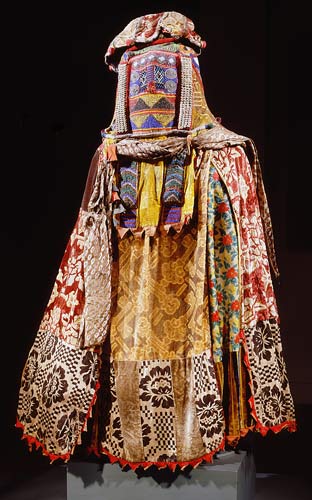
Egungun Masquerade Dance Costume: Ekuu Egungun
Early 20th century
Yoruba peoples, Oyo region, Nigeria
Cloth, metallic thread, glass beads, cowrie shells
Museum purchase: Friends of Ethnographic Art Fund, 92.54 (cat. 44)
Egungun is a visible manifestation of the spirits of departed ancestors who periodically revisit the human community for remembrance, celebration, and blessings. It is a unique cultural tradition practiced by the Yoruba of West Africa and their descendants in the African Diaspora, particularly in Brazil, Cuba, the Dominican Republic, Barbados, and the United States. These spirits constantly bless, protect, warn, and punish their earthly relatives depending on how their relatives neglect or honor them.
The appearance of Egungun in a community is invariably accompanied by pomp and pageantry, drumming and dancing, singing and celebration. The ensuing festival goes on for several days and strengthens the bonds that unite families and communities with departed ancestors. The costumes are constructed of disparate fabrics, both locally woven and industrially manufactured, in addition to metal, beads, leather, bones, and potent empowering materials. Today the fabrics chosen are literally the best that money can buy, and include damask, velvet, silk, Indian madras, and printed cotton. These masquerade performances are often accompanied by the swirling of fabrics and colors, augmented by intricate body movements and carefully orchestrated dance steps. At best, Egungun is both a fanciful parade and a concrete manifestation of the acrobatic displays of spirit in motion.